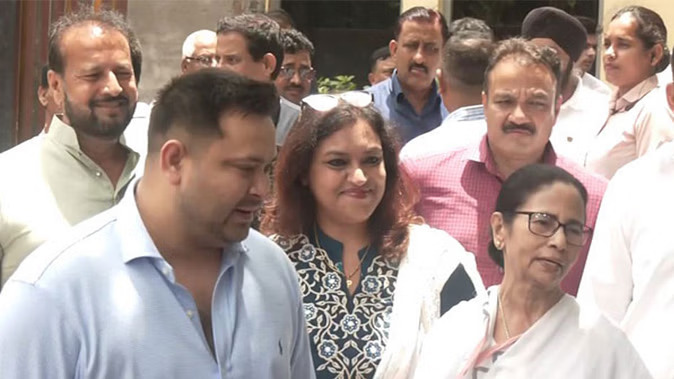By :- Shruti Tiwari
The Election Commission’s recent move to launch a door-to-door voter verification campaign has stirred political controversy, with prominent opposition leaders including West Bengal Chief Minister Mamata Banerjee and RJD’s Tejashwi Yadav raising strong objections. The campaign, which is starting from Bihar, aims to identify and eliminate fake and ineligible voters from electoral rolls. While the EC maintains this is a routine and lawful exercise, opposition leaders see it as a backdoor implementation of the National Register of Citizens (NRC).
The EC’s Campaign and Political Uproar
The Election Commission has begun physically verifying voter identities at the household level, beginning with Bihar, where state elections are scheduled later this year. According to RJD leader Tejashwi Yadav, the sudden need to verify over 80 million voters within a month is suspicious. He has questioned the urgency and timing of the exercise.
West Bengal Chief Minister Mamata Banerjee echoed similar concerns, calling it an indirect attempt to impose NRC — a move that previously triggered widespread protests across the country. Both the Trinamool Congress (TMC) and RJD have opposed the campaign, alleging that it might be used to target specific communities under the guise of cleaning voter rolls.
Legal Authority and Ground-Level Impact
Constitutional and legal experts argue that the Election Commission is fully empowered to conduct such verification drives. The Representation of the People Act authorizes the EC to update and correct electoral rolls periodically. Hence, any opposition to the process is unlikely to hold legal ground.
The real impact of this verification could emerge in border states like Bihar and West Bengal, where reports have long suggested that illegal Bangladeshi immigrants may have been included in voter rolls. If a significant number of such voters are removed, it could drastically change the electoral dynamics in upcoming elections.
Lessons from Assam and the Shadow of NRC
Assam has already witnessed a similar situation, where over 30,000 fake voters were identified and officially labelled as Bangladeshi infiltrators by the state government. However, many of them reportedly disappeared before action could be taken. Authorities suspect these individuals may have migrated to neighboring states like Bihar, Jharkhand, Tripura, or West Bengal.
During the previous attempt to roll out NRC nationwide, the move was met with widespread resistance. The government claimed the NRC would help identify illegal immigrants without affecting Indian citizens. However, the plan was eventually shelved due to massive protests and legal complications.
Mamata Banerjee: “NRC by Another Name”
Mamata Banerjee has openly alleged that the current voter verification drive is NRC in disguise. She expressed concern that a particular community — Muslims — might be selectively targeted, thereby infringing on their voting rights. The TMC claims that such moves could disenfranchise genuine citizens under the pretext of combating illegal immigration.

BJP’s Counter: “Fear of Losing Fake Voters”
Responding to the opposition’s criticism, BJP leaders have defended the EC’s initiative. West Bengal BJP President Sukanta Majumdar accused Mamata Banerjee of indulging in minority appeasement at the cost of national security. He claimed that TMC has benefitted electorally by protecting fake voters and that the party fears losing its grip over several constituencies if these names are removed from the rolls.
Bihar-based political analyst Dhirendra Kumar remarked that the opposition’s reaction indicates their unease with the possibility of losing a section of their voter base. He also noted that linking this lawful EC exercise with minority victimhood may backfire if the BJP successfully frames it as an issue of national integrity.
Opposition Divided and Cornered?
BJP spokesperson Jayaram Viplav criticized the opposition for their contradictory stance — demanding fair elections on one hand, while opposing steps to clean the voter list on the other. He accused them of opposing for the sake of opposition, thereby undermining public trust in democratic processes.
Conclusion: A Legal Battle or Political Maneuvering?
As the EC continues its verification drive, it is clear that the issue is more political than procedural. While the opposition alleges ulterior motives, the BJP sees it as a necessary step to protect the integrity of Indian elections. The coming months — with elections in Bihar and West Bengal on the horizon — will reveal whether this exercise reshapes electoral politics or becomes yet another flashpoint in India’s deeply polarized political landscape.

